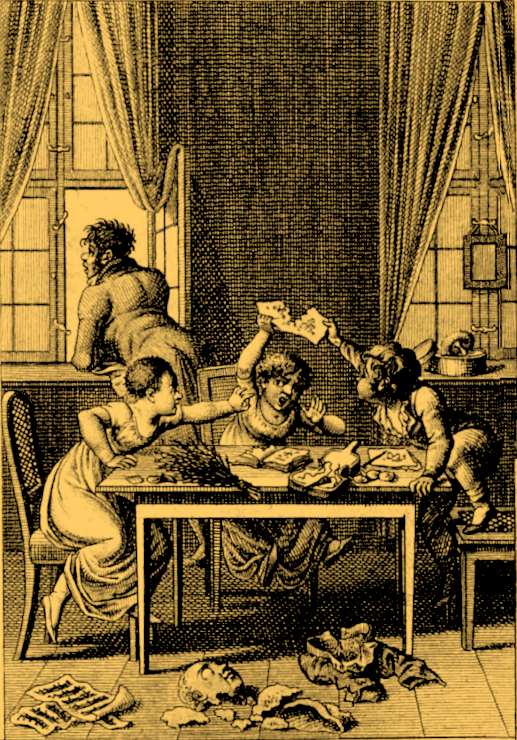393f. Jakob Salat to the Oberdeutsche allgemeine Litteraturzeitung “Concerning Herr Professor Schelling“: Munich, 4 June 1805 [*]
Concerning Herr Professor Schelling
I have nothing to do with the anecdotes that have hitherto been disseminated from Würzburg against Herr Schelling in various periodicals, e.g., in Der Freimüthige; they rest on their own merits, and may the editors themselves stand behind them.
What I have written about Herr Schelling’s teachings or, to the extent he is involved with them, about him personally, I own as an upright man. (Three or four years ago, I was the first to begin speaking out in this Litteraturzeitung about this idealisticism as it began its characteristic development.) Indeed, I summon every friend of truth who is otherwise concerned about this issue to compare that which I (here or there) wrote about Herr Schelling or his teachings with his total assault as published in the Intelligenzblatt of the Jenaische Allgemeine Literatur-Zeitung, issue 48! —
I confess, this particular mode of self-defense reminded me of Schelling’s attack on Reinhold in the first issue of his Kritisches Journal der Philosophie, [1] and of the judgment a noble and profound thinker passed on precisely that attack. See Ueber den neuesten Idealismus etc. (Munich: Lindauer, 1803), 84–86. [2] —
Can a phillosophical mind express itself thus? I would very much like to hear the opinion regarding this question from a man to whom Germany attributes true, higher erudition, e.g., from a Jacobi or Sailer, a Reinhardt or Paulus.
I do, by the way, find it both appropriate and humane that one separate the person from the thinker, the conviction from the system. But those who look more deeply: will they not also discern a connection? Indeed, such a connection does require a deeper look; and it is the (true) perspective of totality that demands it. For it is within time that the eternal develops, albeit only gradually.
Whether I succeeded in distinguishing and connecting appropriately I will let the critical and concerned reader of my most recent publication decide (Ueber den Geist der Verbesserung im Gegensatze mit dem Geiste der Zerstörung)! [3] Precisely there may those who otherwise take an interest in this quarrel determine whether I be concerned with the true issue (according to my conviction) or am instead opposing any person. For here, too, as is reasonable, a special section is also devoted to “the most recent philosophy” — vol. 2, pp. 533–657 —, to the extent such philosophy has already come to participate in reality, addressing the most important subjects of humankind. [4]
Munich, May 1805
Professor Salat
Notes
[*] Source: Oberdeutsche allgemeine Litteraturzeitung 18 (1805) 67 (4 June 1805), 1071–72.
Response to Schelling’s “An das Publikum,” Intelligenzblatt of the Jenaische Allgemeine Literatur-Zeitung 48 (6 May 1805), 417–22 (letter/document 393b). Back.
[1] “Ueber das absolute Identitäts-System und sein Verhältnis zu dem neuesten (Reinholdischen) Dualismus: Ein Gespräch zwischen dem Verfasser und einem Freund,” Kritisches Journal der Philosophie I (1802) 1, 1–90, a dialogue between the author and “a friend” concerning the relationship between the system of identity and the most recent iteration of Reinhold’s dualism. Back.
[2] Ueber den neuesten Idealismus der Herren Schelling und Hegel: Kritiken, nebst Auszügen aus Briefen u[nd] über die eigentliche Tendenz dieser Philosophey, ed. “a friend of philosophy” [Kajetan Weiller] (Munich, Leipzig 1803), 84–86 (chap. 3: “Excerpts from Letters”) (representative illustration not included in Weiller’s review: Berlinischer Damen-Kalender auf das Jahr 1805):
These people are much too candid with one another [fn: the previous discussion involved the clique and esp. Bernhardi’s (periodical) Kynosarges]: they may very well lie, but they do not understand how to deceive: and one will never get very far with the former without the latter. —
I truly feel sorry for poor Schelling. God, what that man must have endured when he felt all the same vexation he served up over 130 pages for us to read! [fn: viz., in the first issue of his Kritisches Journal etc., in which, after almost two years, Herr Schelling assails Reinhold’s review of his System of Transcendental Idealism in the A.L.Z. – The editor.] He wanted to get rid of it, pour it down the drain; but as one can clearly see, this vexation knows no end. The more he pours out, the fuller does the vessel become, till, finally, the flow that replaces what is poured out finally tears it from his hand.
Time and again, I shuddered while reading, and yet could constantly not help but laugh at the same time and afterward. When one sees such a grown, 30+-year-old man have a tantrum like a child, stamp with his feet and pound with his hands, shout, scold, slobber, and spit, spin around like a crazy person, unable either to control or to help himself: what a repulsive, tormenting, and yet invariably also amusing, laughable scene. —
After Schelling’s dialogue, I read Reinhold’s essay for the first time, the one that prompted Schelling’s tirade in the first place. What a different piece of work, and what a different human being was the author!
The only thing that bothered me was the word atheism at the end, since being called an atheist is today insufficiently indulged and publicly acceptable. [fn: To the extent, that is, that a person might err solely as a result of speculation.] And what is left of Bardili’s theism if it not be assisted by a “plus” from somewhere or other” etc. Back.
[3] Jakob Salat, Ueber den Geist der Verbesserung im Gegensatze mit dem Geiste der Zerstörung: Ein Versuch, mit besonderer Hinsicht auf gewisse Zeichen unserer Zeit, 2 vols. (Munich 1805). Back.
[4] Daniel Nikolaus Chodowiecki, “Die Philosophen,” Illustrationen zu Erasmus’ Lob der Narrheit in sechs Abteilungen (1780); Herzog Anton Ulrich-Museum; Museums./Signatur DChodowiecki WB 3.31:

Translation © 2017 Doug Stott

